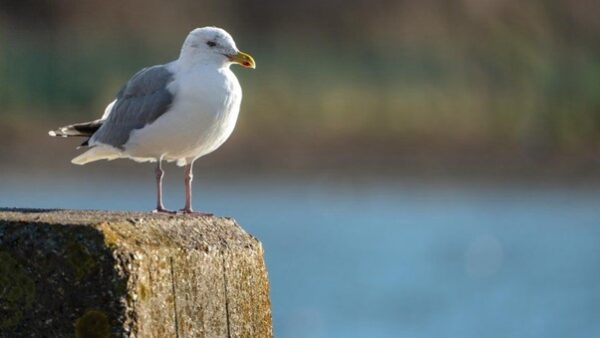The six main UK gull species – the black-headed gull, common gull, Mediterranean gull, lesser black-backed gull, herring gull and great black-backed gull – are all declining and either amber- or, in the case of the herring gull, red-listed.
Photo: Tony Jolliffe/BBC. The herring gull is on the UK Red List of birds of conservation concern.
Hit by multiple pressures, from avian flu to depleted fish stocks, gull populations are dwindling in the wild. Driven into urban areas to survive, they are coming into conflict with humans for stealing food. But rather than seeing them as pests we should respect these “clever birds”, said one expert.
“When we see behaviours we think of as mischievous or criminal – almost, we’re seeing a really clever bird implementing very intelligent behaviour,” said Prof Paul Graham of the University of Sussex. “I think we need to learn how to live with them.”
Excluded from their natural habitats by human activities, species that can adapt to urban life, such as the herring gull, have little choice but to move into urban areas to pick through our waste, he said.And what’s thought of as nuisance behaviour is a sign of their smartness and social learning skills.
“During their lifetime they learn about which items that are discarded might be food and they’ve probably learned that by observing older birds. Over time, they’ll build a repertoire of quite skilled behaviours which enables them to liberate food either from your bins or from humans directly.”
There are simple solutions to the problem, Prof Graham added, such as providing larger, more secure bins in public spaces and educating people not to leave leftover food lying around.
“They’re very charismatic creatures and definitely get a bad rap for sometimes aggressive behaviour in the breeding season,” said Emma Caulfield, who runs The Winter Gull Survey (WinGS). “But they are part of our natural world and they’re just taking advantage of the hand that’s been dealt them.”
More data on winter gulls will be collected at the end of the year. Anyone with enough knowledge to tell the different gull species apart can sign up to help. The data that will be used to develop better conservation strategies for gulls.
While natural nesting populations are in decline, some believe numbers of birds nesting on buildings have increased, but there is limited data to back this up, according to Natural England.
To read the full article in BBC News click here.
